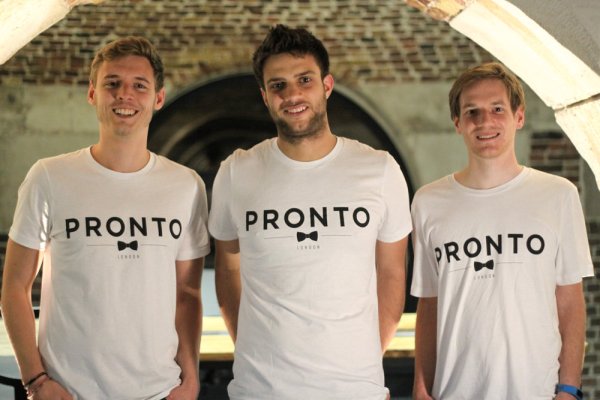Fueled by apps and the web, ‘on-demand’ is a big business right now. Uber is on-demand transport and (eventually) logistics. PostMates is on-demand delivery. TaskRabbit is on-demand you name it. Everything is on demand, and there are few places where on-demand is bigger than the simple human needs of food. That’s why JustEat IPO’d, that’s why Rocket Internet is pouring money into Delivery Hero… the list goes on.
Now a London startup is joining the fray, but – as these things go – it believes it has a different enough take on the model. That ‘take’ though has now convinced investors to slap down cash on the business. Pronto has now raised £1m/$1.6m in seed funding from a collection of investors including Playfair Capital and Seedcamp. Other investors include the London Co-Investment Fund, Ballpark Ventures (run by Russell Buckley), Patrick de Laive (co-founder of The Next Web) and several other undisclosed strategic angel investors from EU VCs and food businesses.
It has competition on its hands though. Deliveroo in London is one of the fastest growing tech companies in the capital, having just raised $70m. Meanwhile, Rocket is reportedly raising €1billion, and a large part of that will purely be for EU-based food startups. Given that 15 million people eat three times a day in London alone, this is a big potential market – assuming everyone will regularly order out instead of cooking their own food.
Their approach is to offer ‘healthy’ versions of typical British food (ok, just go with it) to your door or desk in 20 minutes from their own kitchens, by their own bow-tie wearing drivers (did someone say Lyft with food?).
Co-founder James Roy Poulter says: “We are building the food infrastructure of the future, replacing kitchens and supermarkets. Consumer facing apps represent less than 5% of our technology, it is the technology in the kitchens, at our HQ, and with our drivers that is important.”
The problem they hope to solve is that most on-demand food is unhealthy, and a lot of ‘healthy’ food can, let’s face it, end up being unsatisfying (at least to Londoner’s tastes). Meanwhile, current food infrastructure is very poor: 10-40% of food is wasted at source, consumers then throw away 30% of everything they buy. In theory, on-demand food that you actually like and want to eat could help solve that. Assuming you can still stomach the fact that someone is driving a meal to you in a gas-guzzling vehicle, of course.
Poulter has family background in the hospitality and restaurant industry, and his co-founder Simone D’Amico currently owns a couple of restaurants in Italy. They are joined by third co-founder and engineer, Lukáš Doležal. The startup has also previously been a part of TechPeaks (Italian accelerator), and Mass Challenge (US originally, now UK outlet accelerator) here in the UK.
“Every meal has 2 of your 5 a day to start,” he says. “Then It’s the cooking process – chicken in ovens, not fried. Pulled pork made in a huge process without any added sugar or BBQ sauce – it all comes from cooked down vegetables and spices. Low salt, no MSG, no added sugar or flavourings as default. It might be chicken burgers, meatballs, pulled pork. And there are no freezers. The speed from farm to fork is important. A typical Apple can be 6-8 months old in Tescos.”
Pronto has gone “full stack”. Where Deliveroo charges 23% + VAT, Pronto gets 100% of the sale by controlling everything, from the kitchens to the cars. Meals are from £8 with no minimum order or delivery fee.
They do this by running their own kitchens, with their chefs, their own procurement, menu and delivery fleet. The containers it comes in are 100% recyclable and 70% compostable.
So far they are small: around 1,000 core customers, but they claim they are ‘sticky’, with some users who have ordered more than once a day for more than 6 months and some customers ordering on average over 5 times a month.
Pronto makes its ’20 minutes average’ delivery time from order because they have a small, limited menu, 80% of the food prep is done before service starts, and the driver is usually driving to a repeat customer so they already have the directions.
“We cook the same things every day. This allows a simple process to be executed by well-trained staff. Far far simpler than new dishes every day,” says Roy Poulter.
The new ‘meals on wheels’? Perhaps. In my opinion, it’s hard to see this business scale beyond London, or perhaps one or two other cities in the UK. There’s just too much competition. But if they get the model down and the efficiencies right it’s potentially a large business, even if it’s not a tech company in the traditional sense.
Then again if the model works very well, Rocket may just pick them up and suck them into the Death Star. This is probably something that has crossed the minds of the investors.
